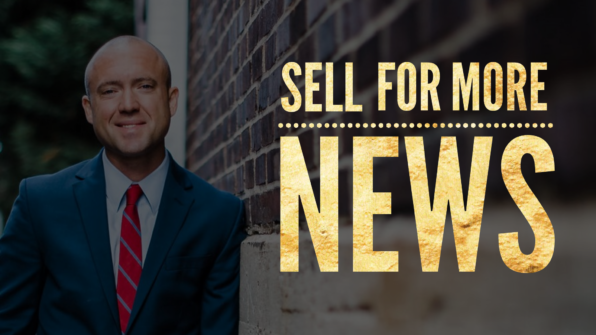Sell for More News is a weekly blog series with interesting information from the world of commercial real estate.
JLL recently published a prediction that in some markets, the flexible workspace industry may triple this decade and that by 2030, it will account for 30% of all office space.
That means companies that can stand their ground may see things looking up in the future…but operating flexible office space is a tough gig right now.
As WeWork fights to retain tenants around the world in what some are calling a “vacancy crisis”, other companies in the flexible office space industry see mixed results.
Convene began to reopen its offices in June. Convene CEO Ryan Simonetti told Bisnow that he hoped for 25% to 50% daily occupancy at best by the end of 2020.
Knotel, which let go of half its staff this year while Q2 revenue fell 20%, just announced a $100M funding round that may skewer its valuation.
Case Study: Breather
According to Bryan Murphy, CEO of flexible workspace provider Breather, a pandemic-fueled transformation is already in swing.
“We’ve seen business more than double in the last 30 days,” he said. The acceleration is being fueled primarily by companies that are abandoning traditional office space arrangements in favor of greater flexibility.
“Most of our new customers are coming from leases that they’ve let expire,” he said. “They’re saying, ‘We know that we don’t want to sign a new lease right now, we know that we need a little less space — 20% is a very typical number…and these are turnkey spaces that we can move right into.”
Whether companies are ready to transition to new office space…flexible or otherwise…Murphy is confident that a growing number will abandon the pre-pandemic status quo of years-long leases.
“I talk to dozens of companies every week, and in the short term, no one’s signing leases,” he said. “There’s the economic uncertainty. Offices are expensive…very expensive. And there is space uncertainty: Some people are working from home full time, some people part time, but it’s here to stay.”
We’ve seen companies leave the permanent office altogether,” he said. “They don’t need an office until they need it: team meetings, client meetings, board meetings. “And then, they’re finding they can book on-demand,” he said.
Murphy’s company, which operates in 10 major markets in the U.S., UK and Canada, offers private, flexible office space via an Airbnb-esque mobile app. Parties as small as one can book space for rental periods as brief as one hour, with no membership commitment.
Unlike coworking spaces, each space is private, which Murphy said used to be valuable to companies that wanted to build a strong culture or who valued privacy. Now, health is also a major factor.
“The advantage we have over coworking is you’re not in there with other people or other companies. In a COVID world, that’s all the more important to customers”, he said.
In response to the market, Murphy said Breather has begun working directly with new landlords who are pivoting from renting their space on traditional long-term leases.
Breather is building out its landlord partnership program and it has expanded into suburban markets for the first time.
With around 100 employees, Breather itself is returning to its 2019 trajectory of growth despite the world’s uncertain footing. “We’ve been hiring, but I don’t think we’ll need more space because we put our people in Breathers,” Murphy said.
Beau’s view:
As the founder of two coworking centers, I can tell you that the flexible office business was difficult even before Covid-19. In fact, I’ve been telling people for years that WeWork was unsustainable.
I think the business model that ultimately survives and thrives is a profit sharing model between property owner and operator. In this scenario, the operator will protect its downside but also limit its upside.
Clearly, the path forward for office space is murky (pun intended). Office landlords will be forced to get creative. And the landlords who give tenants what they want…and can still turn a profit are the ones who will win.
It’s going to be a slow, arduous process. Companies are going to feel it out.
I expect the only tenants who will be interested in the standard 5-7 year lease will be those who are making a big financial commitment to the build-out of the space. Otherwise expect shorter term leases with more flexibility for tenants going forward.
Now, if landlords can convince tenants to pay a premium for that flexibility…then we may find a profitable way out of this.
(FREE PROMOTION) Find out how much your property is worth, for free, before you list it for sale. Get the blueprint to sell your property for the highest price the market will pay (click here)
How to get an unfair advantage. Click here to join Sell for More Club today.
Own a business? 90% of business owners don’t know the market value of their business. If you’re considering selling a business, click here for a free business valuation.
About Beau Beach, MBA CCIM
Beau is a tenacious Commercial Real Estate Broker, author and adoring father of four. His clients appreciate his no-nonsense demeanor and his legendary work ethic.
Beau leads Beachwood which is a commercial real estate broker for sellers in the Nashville, Milwaukee and South Florida markets.
He’s the author of the books The 3 Reasons: Why Most Commercial Properties Don’t Sell and True Wealth: What Every Seller Should Know About 1031 Exchanges.
Beau can be reached at 800-721-3287, click to schedule a call or Beau@soldbybeachwood.com
